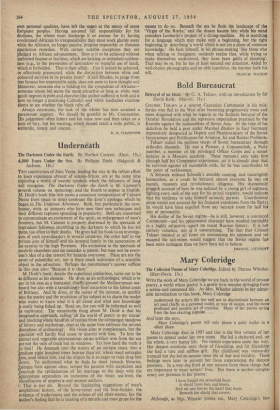Colour Bar
Colour Bar. By Learie Constantine. (Stanley Paul. 12s. 6d.) WHAT with the policy of Dr. Malan's government and Mr. Constan- tine's cricketing fame and popularity, most people who read his book will do so with an indulgent eye. To resort, as he often does, to the language of cricket, he plays a fast, streaky, opportunist innings against time. He is out, he says, to hit sixes; at times the colonialist bowling deceives him and he flukes and snicks outrage- ously; the lapses are interspersed with some good attacking batsman- ship, and he can always slam a no-ball from South Africa into the stands. It is the kind of innings that raises cheers and causes bitter and inconclusive arguments. And that is about as far as cricketing imagery will take us.
To deal first with defects. Mr. Constantine insists on dividing the world's population between the whites (all those of pure European descent) and the coloured (all the rest)—a distinction which weakens his focus but enables him to score a number of facile debating points. Coloured people can be intelligent (photograph of a smart sceptical- looking Chinese girl), mechanically progressive (model of Howrah station), militarily formidable (Japanese successes in World War II), spiritual (they founded all the great religions). All this has precious little to do with the real evils of the colour bar, which bear chiefly on Africa, and the real sufferers, who arc nearly all negrocs. Again, there is scarcely a word on recent progress in British West Africa or the USA, or indeed in any 'white' country except the USSR, and it is surely worth mentioning that the main British motive in the penetra- tion of East and Central Africa was the desire to stop the slave trade. Elsewhere the text is riddled with unfair, misleading, oversimplified or simply inaccurate statements or suggestions. It is surprising to learn (p. 73) that segregation is proceeding rapidly in all schools, restaurants, hotels, theatres and trains in the southern USA; that hundreds of thousands of Indians die of starvation every year ; that the only fault of the late government of British Guiana was to threaten a foreign fruit empire; and that Mau Mau is an ancient society linked—by who knows what means—to similar bodies stretching right across Africa, and largely engaged in maintaining order in areas untouched by white men and settling inter-tribal disputes. Finally, the photograph of an American negro being burnt in kerosene, Which bears no date, may suggest a very recent outrage; it was taken —as I found after some research—in 1925.
These, however, are understandable though not inevitable blemishes on the work of a sincere and angry man. Regrettably, they may Persuade some people to dismiss this book as pernicious drivel, which it is not. Mr. Constantine has every reason to be angry; sometimes—as in dealing with South Africa—he communicates his anger and his solemn warning with clarity and power, and for all his anger he remains personally uncommitted to fanaticism. Though genuinely impressed, however naïvely, with Russia's handling of her Minorities, he is not a Communist and deplores the spreading whisper of communism in Africa. 'God knows,' he writes, 'what distortions of the idea that once inspired Communism are now afoot.' It is worth recalling that this book is important as a record of deeply and often blindly held feelings and not of complicated and misunder- stood facts, and that Mr. Constantinespeaks aca convinced democrat who wants to see democracy working in Africa. Yet this, he says, Is how it looks to Africans:
own personal qualities, have left the negro at the mercy of more fortunate peoples. Having assumed full responsibility for his destinies, the whites must discharge it or answer for it; having condemned Africans to irresponsibility they must work glumly away while the Africans, no longer passive, propose impossible or threaten purderous remedies. With certain notable exceptions they are pledged to African advancement. How is it to be achieved without unlimited finance or facilities, which are lacking, or unlimited ruthless- ness (e.g., in the prevention of destructive or wasteful use of land), which is forbidden. That is their affair. Can it indeed be achieved, or effectively prosecuted, while the distinction between white and coloured survives in its present form? (Cecil Rhodes, to judge from One famous but unprintable aside, does not seem to have thought so.) Moreover, someone else is bidding for the sympathies of Africans— someone whose bid seems the more attractive so long as white men insult negroes in pubs and churches (the author suffered in both and is now no longer a practising Catholic) and white landladies examine sheets to see whether the black rubs off.
Always enormous, the task of the whites has now assumed a
iaramount urgency. We should be grateful to Mr. Constantine. 's judgement often falters and his voice now and then takes on a ote of fury, but his warning, which should reach a wide public, is uthentic, timely and sincere. H. M. CHAMPNESS



































 Previous page
Previous page